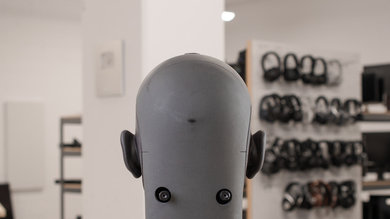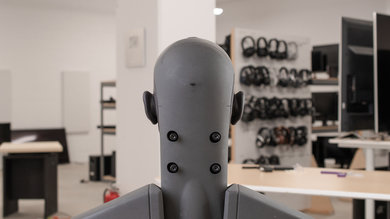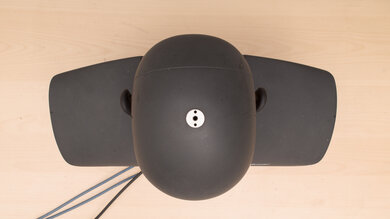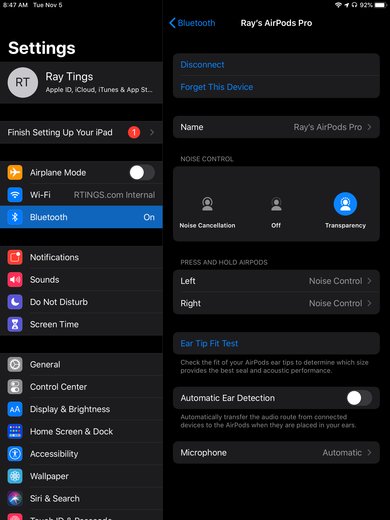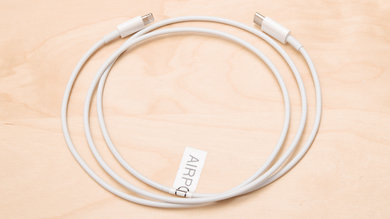The Apple AirPods Pro Truly Wireless are a welcome upgrade of the Apple AirPods (2nd generation) Truly Wireless. Their in-ear fit helps make them more stable, and they've significantly improved their audio delivery, though some may find this design less comfortable. Their active noise cancelling feature also works very well and makes them well-suited for use at work. While they're smaller than previous models thanks to their shorter stems, they offer longer battery life and have an easier-to-use touch control scheme.
Our Verdict
The Apple AirPods Pro are decent for neutral sound. They can deliver audio very consistently, and they have a fairly flat and neutral sound profile that's well-suited for a variety of audio content. However, their low bass is a bit underemphasized, so mixes lack thump and rumble. Their passive soundstage also seems small and closed-off due to their in-ear fit.
- Bad passive soundstage.
The Apple AirPods Pro are great for commuting. These in-ears have a small and lightweight design, which makes it easy to take them with you on the go. They have an ANC system that can block out the low rumble of bus and plane engines. Unfortunately, their continuous playback time of over five hours may not be enough for long days on the road, although their carrying case holds roughly five extra charges if you need it.
- Great ANC performance.
The Apple AirPods Pro are great for sports. They have good stability, although it can vary depending on your ear shape, and also come with a few different tip sizes so you can find the best fit for you. They're also small, lightweight, and are certified IPX4 for protection against splashes of water. They also have a great ANC feature that helps to cut down ambient noise at the gym.
- Great ANC performance.
The Apple AirPods Pro are decent for office use. They're comfortable and block out a good amount of ambient chatter around you. They're very lightweight and comfortable, meaning you can wear them for a full workday without feeling too fatigued. Unfortunately, their battery won't quite last a full day of work, and they take a bit longer than previous models to fully charge, meaning you may need to take a break from your music while they charge.
- Great ANC performance.
- No NFC or multi-device pairing.
- Mediocre controls.
The Apple AirPods Pro aren't recommended for wireless gaming. They're Bluetooth-only, so they aren't compatible with Xbox or PlayStation consoles. While you can connect them to a Bluetooth-enabled PC, the latency will likely be too high for gaming.
The Apple AirPods Pro are Bluetooth-only headphones, and you can't use them wired.
The Apple AirPods Pro are alright for phone calls. Unfortunately, their integrated mic does a disappointing job of capturing your voice on PCs, so it sounds muffled and a bit distorted. While the mic does a better job of noise handling, it can still be difficult for the person on the other end of the line to hear you clearly if you're in a moderately noisy environment like a busy street. That said, if you're taking a call via iPhone, the mic offers a slightly better noise handling performance when it comes to loud sounds. These headphones also have a great ANC feature, so you can focus on your call.
- Great ANC performance.
- Disappointing mic recording quality.
- Mic has passable noise handling.
Changelog
- Updated Sep 19, 2023: Added a note that the Denon PerL Pro True Wireless have app support with more customization features.
- Updated Jan 17, 2023: We've added information regarding Apple's Headphone Accommodations feature in theSound Profile and App Support tests. However, the scoring of these tests hasn't changed.
- Updated Dec 09, 2022: Users have requested us to retest the ANC's Noise Isolationperformance after FW 5B58. However, we encountered issues and are currently investigating and will update our review with our results.
- Updated Nov 23, 2022: We have added a comparison between these headphones and the Apple AirPods Pro (2nd generation) Truly Wireless in Comfort.
Check Price
Differences Between Sizes And Variants
The Apple AirPods Pro come in one color variant: 'White'. That said, in 2021, Apple released an upgraded variant of these headphones that come with a MagSafe-compatible charging case. There wasn't an advertised change to the performance of the headphones, though. We tested the original variant, and their carrying case doesn't support this feature. However, we expect this variant to otherwise perform similarly to our model.
This review also currently reflects the performance of our original unit, which we don't have anymore. That said, we've purchased a second model, which matches the performance of our first unit. If there's a difference in performance during future retests, we will update the review accordingly. You can see our new unit's label here.
If you come across another variant of these headphones, please let us know in the discussions.
Popular Headphones Comparisons
The Apple AirPods Pro are solid, truly wireless earbuds that look and feel premium as well as have a great ANC feature. Their sound reproduction may not be as good as some similarly-priced options from competitors, but they're a big improvement over the Apple AirPods (2nd generation) Truly Wireless. They also have an H1 chip so that you can seamlessly pair them with your Apple devices and newer models have a carrying case that supports MagSafe wireless charging.
We suggest looking at our recommendations for the best truly wireless earbuds, the best noise cancelling earbuds, and the best wireless earbuds for iPhone.
The Apple AirPods Pro are an older model than the Apple AirPods 4 and each have slightly different strengths. If you want noise cancelling and an isolating fit, the AirPods Pro provide a more predictable in-ear fit compared to the loose and open-backed fit of the AirPods 4. The AirPods 4 have a better mic with more powerful noise handling for calls and the newer H2 chip, but they don't isolate you from the environment.
The Apple AirPods Pro are better in-ears than the Beats Studio Buds True Wireless. The Apple headphones are better built, are more stable in-ear, and have a more neutral sound profile, which some users may prefer. As well as having better ANC and battery performance, they come with an H1 chip that lets you seamlessly pair them with other devices in your Apple ecosystem.
The Apple AirPods Pro (2nd generation) are the next version of the Apple AirPods Pro. While not a lot has changed in terms of comfort and premium build quality, there have been slight changes to their sound profile and noise isolation performance. The 2nd generation's ANC does a significantly better job of blocking out background noise across the spectrum. Additionally, they have a longer continuous battery life, though they're one extra charge short of their predecessor. Their carrying case has a U1 chip, too, so you can easily locate your case if you lose it. Overall, the changes are somewhat minor, but the 2nd generation make good strides in the right places.
The Apple AirPods Pro are better overall headphones than the Beats Fit Pro True Wireless. The Apple headphones are more comfortable and feel better built, and their ANC offers a significantly better noise isolation performance. They also have a significantly better battery performance especially as their carrying case holds roughly five additional charges. However, the Beats have a more stable in-ear fit.

We've upgraded our Headphones Test Bench to 2.0! This update brings several key changes to our tests and usages, making it easier than ever to interpret our sound results based on your personal preferences. You'll also find a brand-new interactive graph tool featuring multiple targets (including our own!) for you to explore and compare.
For a full breakdown, check out our changelog, which includes detailed commentary from our test designer explaining the rationale behind our update.
We'd also love to hear your thoughts: your feedback helps us keep improving, so join us in the comments!
Test Results

The Apple AirPods Pro are comfortable for in-ear headphones. They come with three sizes of silicone tips and don't enter too deep into the ear canal. They're very lightweight and don't pressure on your ears, meaning they're barely noticeable. That said, like their successor, the Apple AirPods Pro (2nd generation) Truly Wireless, some users find that the buds wiggle out of their ears over time, which can be a little annoying as you'll need to adjust their fit each time this happens.
Update 11/26/2021: We have changed 'OS Compatibility' from 'iOS' to 'Not OS specific' as the call and music controls work on both Android and iOS devices. However, Android users can't use the voice assistant feature. As a result, we have updated our review to reflect this change.
The Apple AirPods Pro have passable controls. They have an indented 'force sensor' on each stem, but they don't provide any tactile feedback. However, the buds play a sound when you register a command. The controls are very straightforward, and they even work on Android devices, although you can't configure them to activate a non-Siri voice assistant. Although they don't have physical volume controls, you can request Siri to raise or lower the volume. You can also remap the 'Press and Hold' command if you want voice assistant control instead of ANC.
On either stem's force sensor:
- One press: Play or pause audio. Also answers a call.
- Double press: Skips a track forward. Also declines a call and sends it directly to voicemail.
- Triple press: Skips a track backward.
- Press and hold: Cycles between ANC on and transparency mode, which allows you to hear your surroundings without turning off your audio.
- Say 'Hey Siri': Activates Siri voice assistant. This command only works on iOS devices though.
Update 12/14/2021: Apple silently released a new variant of these headphones, which have a case that's compatible with the MagSafe wireless charger. We tested the original variant, which have a case that doesn't support this technology. However, there otherwise isn't any difference between this model and our model.
Update 11/26/2021: After testing the Apple AirPods (3rd generation) Truly Wireless, we noticed that the scoring of the Pro's case needed to be re-evaluated. The case feels great, but there are similar cases that are as good, if not better than this one. While it's small, lightweight, and supports wireless charging, our model doesn't support MagSafe charging, although Apple now retails a variant that comes with this feature. The one indicator light doesn't do much to tell you the level of the case or buds either. As a result, we're lowering the scoring of this test from 9.0 to 8.5.
Their case is excellent. It's extremely small and portable, measuring only slightly larger than previous models. It'll also protect the headphones well against minor falls and scratches, but not against water damage. Like the Apple AirPods (2nd generation) Truly Wireless, it has a Lightning port so that you can charge it with the included cable. It also supports Qi wireless charging. In 2021, Apple released a new variant of these headphones, which come with a carrying case that supports MagSafe Wireless charging. However, we tested the original model, which doesn't have this feature.
The Apple AirPods Pro have great build quality. They're made from high-quality plastic and will survive a couple of accidental drops without too much damage. Unlike the Apple AirPods (2nd generation) Truly Wireless, these headphones are also certified IPX4 for protection against splashes of water.
Update 12/03/2021: After user feedback and online reports, we've reevaluated their stability. While they still performed well on our stability test, we've lowered their score from 8.0 to 7.5 because many users report having a different experience.
The Apple AirPods Pro have good stability. They don't have stability fins but will stay in place when you're walking around and during light workouts. That said, their stability can vary depending on the user. There are a lot of online reports from people who say their AirPods wiggle out of place very easily when they go out for a walk or even talk while wearing them.
The Apple AirPods Pro have a fairly neutral sound profile, suitable for a variety of audio content. While they struggle to produce thump and rumble, they lack less bass than the Apple AirPods (2nd generation) Truly Wireless, which have an open-back design.
These headphones support Adaptive EQ, a feature that adjusts the sound based on the fit and seal of the headphones on your head. However, you can't turn it off or adjust it. If you're using a fully up-to-date iOS or iPadOS device, you can also access limited EQ settings under the Accessibility settings tab.
The Apple AirPods Pro's frequency response consistency is outstanding. Assuming you achieve a proper fit with the included tips, you'll experience the same sound reproduction every time you use the headphones.
The Apple AirPods Pro's bass accuracy is excellent. Thanks to their closed-back design, they don't have as severe low-bass issues like the Apple AirPods (1st generation) Truly Wireless and Apple AirPods (2nd generation) Truly Wireless. However, the response is still a bit under our target curve, meaning some people may feel like they're a bit light on the low-bass.
The Apple AirPods Pro have excellent mid accuracy. There's a bit of overemphasis coming from the bass range into the low-mid, which somewhat clutters your mixes. However, the rest of the range is very flat and neutral, so vocals and lead instruments are present and detailed.
The Apple AirPods Pro have excellent treble accuracy. While the response is slightly underemphasized across the range, it's still fairly even. Vocals and lead instruments are slightly veiled, while sibilants like cymbals are a bit dulled, though.
These headphones have excellent peaks and dips performance that's fairly flat and even. There's a small peak in the low-mid, which slightly clutters vocals and lead instruments, but it's unequally distributed between the left and right drivers. There's also a small dip between the low to mid-treble, which dulls sibilants, but this won't be too noticeable to most listeners.
The Apple AirPods Pro's stereo imaging is great. The group delay graph shows it's under the audibility threshold, resulting in a tight bass and treble reproduction. The L/R drivers of our unit are also well-matched in frequency, and phase response, which is important for the accurate placement and localization of objects and instruments (like voices and footsteps) in the stereo image. Although there's a small bump in the phase response's low-mid, it may be hard to hear with real-life content. There's also a very minor mismatch in amplitude, but most people wouldn't notice it with real-life content as well. Note that these results are only valid for our unit, and yours may perform differently.
The Apple AirPods Pro have a bad passive soundstage, which is to be expected from in-ears. One important factor for creating an out-of-head and speaker-like soundstage is the activation of the outer ear by different resonances. Since in-ears bypass the outer ear altogether, their soundstage is perceived as being small and enclosed in your head. If you prefer a slightly more spacious in-ear experience, try out the Samsung Galaxy Buds Live Truly Wireless, which feature a semi-open design.
The Apple AirPods Pro have a spatial audio feature, but it's only available on iOS/iPadOS 14 or later. You can turn this feature on and off by going into your iPhone's Bluetooth settings. Turning this feature on also turns on head tracking, which reorients the virtual soundstage to follow your head movements.
The Apple AirPods Pro's weighted harmonic distortion performance is great. It results in a clean and pure audio reproduction, and the bump in the treble range won't be audible for most people. There isn't a big jump under heavier loads either, which is good.
These are the settings we used to test these headphones, and our results are only valid using this configuration. We also used the Adaptive EQ feature during testing, which can't be turned off or changed.
Users asked us to verify the noise isolation performance using firmware 5B58. Unfortunately, we encountered a couple of issues during our retest and are currently investigating them. These buds were originally tested in 2019. Even though we've replaced our unit a few times in the last few years, we've always confirmed that our pair were consistent with our original results. The newest pair was checked in April 2022, but the last time we updated our noise isolation results was in November 2021, using FW 4A400. Since then, there have been four firmware updates.
We've been looking into this issue since October 2022 and compared the noise isolation performance of these buds across the last three firmware updates. Although FW 5B58's ANC results are consistent with the past three firmware results, there's a change between the last time we checked them and now. At the moment, we can't confirm what's causing this change. We'll continue to look further into this issue and will update our review with our results.
The noise isolation of these headphones is great. They do a decent job isolating the low rumble of bus or plane engines, making them a solid choice for commuting. Their mid-range performance is better, making them excellent for blocking out ambient chatter. They can also cut down a lot of high-pitched hum of AC units. That said, if you're looking for an even better noise isolating performance, check out the Apple AirPods Max Wireless.
The Apple AirPods Pro have a great leakage performance. They leak the most sound in the treble range, meaning the leaking sounds thin. It's unlikely that these headphones will bother those around you.
Update 11/26/2021: Due to user interest, we have retested 'Recording Quality' and 'Noise Handling' to see if there's a difference in performance between Bluetooth AAC and SBC codecs. Our testing PC doesn't support AAC, which is the license-free standard for Apple devices. However, we conducted this microphone retest while the headphones were placed on our test head and connected to an iPhone 11, which supports AAC. To retest 'Recording Quality', we played the same 'Recorded Speech' audio clip through our test head. While Bluetooth codecs aren't the sole factor in microphone performance, using the AAC codec, the voice sounds clearer than when connected to our test PC and using SBC codec. You can hear our results here.
For 'Noise Handling', we played the 'Speech + Pink Noise' and 'Speech + Subway Noise' audio clips. Using the AAC codec, we didn't notice much of a difference in performance when it comes to blocking out pink noise from speech. That said, the mic can block more loud noise in the subway recording when connected to an iPhone versus a PC. However, it also cuts out some speech in the process.
We have updated our review, but there hasn't been a change in the scoring of our microphone tests. To ensure comparability between different reviews, we test the mic of Bluetooth headphones using SBC codec as it's almost universally used by these devices.
The recording quality of the Apple AirPods Pro's microphone is disappointing. Recorded speech lacks body and sounds muffled as well as distorted, though you'll still make out what's being said.
The noise handling of the Apple AirPods Pro's microphone is passable. It struggles to separate your voice from ambient noise, even in moderately noisy environments like a busy street. You won't have a problem in a quieter space like at home, though.
The Apple AirPods Pro have an alright battery performance. They last over five hours on a single charge with their ANC on, which isn't as long as the Sony WF-1000XM4 Truly Wireless. Luckily, their carrying case offers five additional charges if you need it. They charge very quickly, and they're even advertised to give you three to four hours of continuous playback on a half-hour charge. They even come with a standby mode that activates when they detect that they aren't in your ears to conserve battery life. However, battery life varies depending on usage, and your real-life experience may vary. If you're looking for truly wireless headphones with even longer continuous battery life, consider the Samsung Galaxy Buds+ Truly Wireless.
The Apple AirPods Pro don't have a companion app, just a settings screen on iOS devices. They have slightly more customization options than the Apple AirPods (2nd generation) Truly Wireless, with ANC and transparency mode toggle, and the ability to change long-press on each earbud to either ANC control or Siri activation. The settings screen also allows you to do a Fit Tip Test to help find which size tips give the best fit, though we had mixed results. If you're using an iOS or iPadOS 14 or later, you can also access Headphone Accommodations in your device's Accessibility tab. This section offers a couple of EQ presets as well as a customized setup based on selecting audio samples that sound best. You can also choose whether these settings are applied to media, calls, or both. However, we don't consider this an EQ since this is out of the app interface. Keep in mind that there are also no customization options for Android devices. However, if you prefer more customization, check out the Denon PerL Pro True Wireless' custom EQ feature or the Anker SoundCore Liberty Air 2 Truly Wireless with their 20 available presets.
The Apple AirPods Pro have fair Bluetooth connectivity. They don't support multi-device or NFC pairing. However, like the Beats Fit Pro True Wireless, they have an H1 chip that allows you to seamlessly pair them with other devices in your Apple ecosystem. They also have low latency on iOS and Android devices, which is great if you stream video. However, their latency is higher on PCs, so you may encounter slight issues with audio and visual synching. Some apps and devices compensate for latency differently, though, so your real-life experience may vary. If you want more gaming-oriented, truly wireless headphones for non-iOS devices, check out the Razer Hammerhead True Wireless 2021.
You can't use these headphones wired, which is expected with truly wireless headphones. They charge via the included USB-C to Lightning cable, and the manufacturer doesn't include a charging power brick in the box.
These headphones are fully compatible with Bluetooth-enabled PCs. However, you can't connect them to your PC in any other way.
The Apple AirPods Pro's charging case is very premium-feeling and is rather small considering its battery capacity. It charges via Apple's Lightning port or any wireless Qi charging pad. However, only the newer model of these headphones support MagSafe charging.








